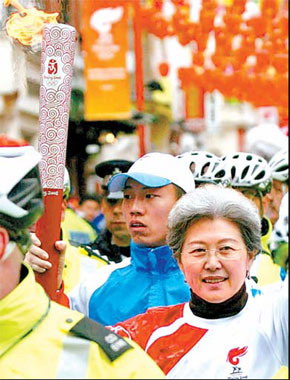LONDON: The British people should not be deprived of the right to know the real China merely because of an information gap, Fu Ying, Chinese ambassador to Britain, said on Tuesday.
 Chinese ambassador Fu Ying runs with the Olympic torch in London on April 6, 2008. [Agencies]
Chinese ambassador Fu Ying runs with the Olympic torch in London on April 6, 2008. [Agencies] |
She told the "China and UK: Partners in Sustainability" forum, sponsored by the China-Britain Business Council, that British people should have the right to know, and to know what is right, but the fact is that a lack of knowledge about China has, to some extent, prevented them from doing so.
Recent events have made her realize there is a huge information gap concerning China in Britain which "is hurting both sides".
Mentioning a recent article she wrote for the Sunday Telegraph, Fu said it drew hundreds of responses. What surprised her was how little knowledge the respondents had of Tibet and other issues related to China.
One example, many British people wrongly believed that Tibet was an independent country five decades ago, and were not aware that Britain once invaded Tibet, which was and is part of Chinese territory.
Most Western people use the term Mount Everest to refer to the highest mountain in Tibet and believe George Everest was the one who discovered it and the first person to measure it, Fu said.
She said what they may not know is that the authorities of the Qing Dynasty in China in the early 18th century twice sent teams to measure the height of the mountain more than 100 years earlier than Everest and the mountain already had the Tibetan name of Qomulangma "long before Everest's grandfather was born".
Rebutting some British media reports that China lacks freedom of speech, Fu said when the National People's Congress and the Chinese People's Political Consultative Conference held their latest sessions last month, about 40 million people visited the Sina.com.cn website, and left more than 3 million questions in response to a call for questions for the premier.
Some of the questions dealt with price increases, the income gap, and various other day-to-day issues. There was also criticism of the government's policies and advice on China's development, Fu said.
She said: "How could so many people in a country without freedom of speech ask so many questions."
In response to criticism that China lacks press freedom, the ambassador said China has about 570 publishing houses that turn out 230,000 different kinds of books every year.
It has 2,000 newspapers, 9,000 magazines, while the websites, Sina.com and Sohu.com, put out more than 10,000 news items a day.
Fu said she found it strange that some Western media, instead of focusing on topics of interest to the Chinese people such as prices and stability, focus more on China's human rights, a topic the Western media have little knowledge of.
"The challenge for China is that while being firm against separation, we also need to learn to inform the world about ourselves" and "must get our stories out so that people around the world can know China better", Fu said.
Noting that China is not perfect, Fu called for more objective information on China being offered to the British people. The information gap must be bridged by consistent efforts, she said.
"I believe in (the British) people, I believe in the sensible judgment of the (British) people, I will continue to try hard to engage the media and the wider public to promote knowledge and understanding of my country," Fu said.